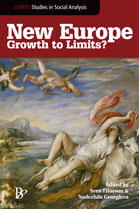
|
New Europe
Growth to Limits?
Edited by Sven Eliaeson and Nadezhda Georgieva
Foreword by Christopher G.A. Bryant
July 2010, 468pp, 234 x 156mm
Hardback, £125.00, ISBN 978-1-905622-27-6
Gemas Studies in Social Analysis
Series Editors:
Mohamed Cherkaoui, Peter Hamilton & Bryan S. Turner
NO LONGER AVAILABLE
Europe is defined by its borders. But which ones? Since 1989, this question has taken on a new meaning for hundreds of millions of people, within and beyond the EU.
This book contains 24 essays contributed by leading European intellectuals to a symposium at the Polish Academy of Science. As Professor Christopher Bryant writes in his foreword, �The new Europe is complex. What and where it is and what it could become are contested intellectually and politically. Contributors to the symposium draw lessons from Kant and Marx onwards.... How far can the European Union be extended geographically? How far, too, can the four freedoms and the single market be developed? What, beyond liberal democracy and a market economy, does the union stand for? On these and other questions the essays in this book offer readers rich food for thought.�
The future of the European Union looks problematic and difficult. This volume provides an essential source of reference for scholars and policy-makers concerned with helping the EU resolve core issues of where its boundaries should be drawn, how its identity should be conceived and the consequences of enlargement to embrace the former Eastern European states.
Anthony Giddens
(London School of Economics)
The meaning of �Europe� is something that becomes clear� or the contradictions and issues with the idea become clear� at the boundaries of Europe, and especially in the east. This volume contains an excellent selection of deeply thought through papers on this important topic.
Stephen Turner
(University of South Florida)
A richly textured and complex book that, by looking carefully into Europe�s moving borders, helps us to better understand their uncertain narratives and identities.
Victor-Perez Diaz
(Analistas Socio-Pol�ticos Research Centre, Madrid)
Contents:
Acknowledgements
Foreword - Christopher G.A. Bryant
Introduction - Sven Eliaeson
PART I
Conceptual History of Identities and Borders
1. The Borders of Europe - J�rgen Kocka
2. Europe as a Political Boundary Concept
- Dieter Gosewinkel
3. Managing Europe�s Fuzzy Borders: Governance, Democracy and Identity Jan Zielonka
4. Territory, History, Identity - Stefan Immerfall
5. �Russia in Europe�: A Historical and Topical Debate
- Helmut Steiner
6. Rationalities of European Integration: Legitimisation and Communalisation - Norbert G�tz
PART II
Borders and Modernisation
7. European Roads to Modernity and Their National Capitals - G�ran Therborn
8. Religion and Economic Virtues - Bernhard Wessels
9. The Moralisation of the Markets in Europe - Nico Stehr
10. Europeanisation: Complying To or Domesticating EU Rules�Some Thoughts on a Comparative Approach to Europeanisation - Fran�ois Bafoil
11. Polities Need Borders�Especially Democratic Ones
Michael Th. Greven
PART III
The Relevance of the Classics of Transformation Processes
12. The Communist Manifesto as a Classic Text - Bob Jessop
13. Gunnar Myrdal�s Brand of Institutionalism and the Prospects of Its Application in the Analysis of Modern Developmental Problems and Post-Socialist Socio-Economic Transformation -
Vilhelm Bohutskyy
14. Individualisation of Identities: Borders for the Self and Threats from Alienation (Re-reading Norbert Elias) -
Nataliya Yeremeyeva
PART IV
Cases: �New� Countries and EU Entrance as a Transformation Factor
15. Membership in Civic Organisations and Social Stratification in 19 Countries - Henryk Domanski
16. The Moving Borders of Rationalisation: Achievements and Limitations in Eastern Europe -
Nikolai Genov
17. Transition Revised: Elites, Power and Democracy in Post-Communist Armenia -
Kristine Barseghyan
PART V
Cultural Bridges and Trenches: Civil Society and Transformations
18. The Role of Historical Politics in the Development of Strategies for Post-Communist Countries� Participation in European Union Structures as Illustrated by Poland
- Joanna Kurczewska
19. Memories as Bridges, Memories as Trenches: Poland�s Memories of �The Other� Since 1989�From Myth to Remembrance to Politics - Slawomir Kapralski
20. The Individualism�Universalism Duality and Social Classes: Comparing Ukraine, Poland and Germany
- Olga Kutsenko
21. Knowledge Society and Public Accountability in Poland
- Teresa Kulawik
22. Hybrid Identities: Romani �Border/Liminal� Intellectuals�A Case Study of Andral Romani Journal
- Nadezhda Georgieva
PART VI
From the Panel
23. Europe and Its Growth to Limits? - Andrzej Rychard
List of Contributors
Index
About the Editors:
Sven Eliaeson is research professor at the Department of Sociology, Uppsala University, and recurrent visiting professor in sociology to the Centre for Social Studies/Graduate School of Social Research at the Institute for Philosophy and Sociology of the Polish Academy of Sciences, Warsaw.
Nadezhda Georgieva is assistant professor in English language, Economics Department, Trakia University, Stara Zagora, Bulgaria. She defended her Ph.D. dissertation on “Reconfiguring Ethnic Identity: Romani Ethnogenesis and Cultural Emancipation in the Contemporary Context of Bulgarian Society” at the Graduate School for Social Research at the Institute for Philosophy and Sociology of the Polish Academy of Sciences in 2006.
|

